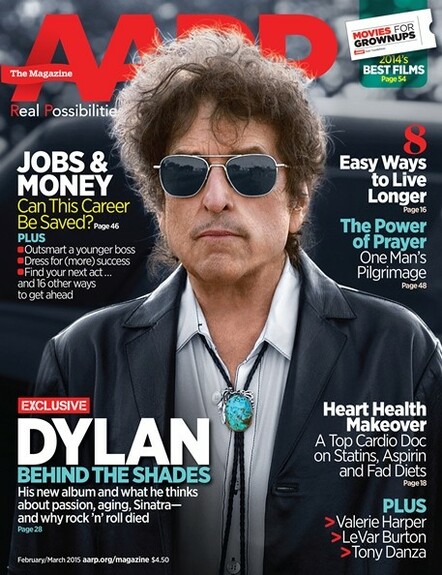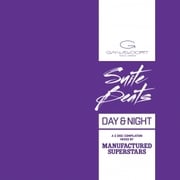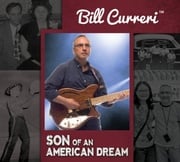New York, NY (Top40 Charts/ AARP) In his first interview in almost three years, legendary singer-songwriter
Bob Dylan spoke with AARP The Magazine in advance of his upcoming album,
Shadows in the Night. The global exclusive interview was conducted by Robert Love, Editor in Chief of AARP The Magazine, and will appear in the February/March 2015 issue. An extended version of the interview will appear in the online and tablet editions of the magazine.
The album, which will be sent at random to 50,000 AARP The Magazine readers in addition to its official Columbia Records release on February 3, features a newly-recorded collection of beloved American songs from the 1920s to the 1960s. Produced by Jack Frost,
Shadows In the Night is the 36th studio set from Dylan and marks his first new music since 2012's Tempest. Its ten songs are based on complicated 30-piece arrangements, refined down by Dylan to a five-piece band and recorded live.
"When Bob Dylan's representatives reached out to me about an interview, my first reaction was to remind them that I am no longer at Rolling Stone," said Love, who was Managing Editor and Vice President at Rolling Stone before taking the helm as Editor in Chief at AARP The Magazine. "There was, however, no mistake; Dylan had deliberately chosen to talk exclusively with AARP The Magazine, giving his one and only interview for his new album to the definitive magazine connecting with Americans who are 50-plus."
Of his decision to talk with AARP The Magazine and gift 50,000 copies of the album to AARP The Magazine readers, Dylan told Love in the interview, "…a lot of those readers are going to like this record. If it was up to me, I'd give you the records for nothing, and you could give them to [every reader of your] magazine. I think a lot of your readers will identify with these songs."
The celebrated artist whose credits include "Blowin' in the Wind," "Mr. Tambourine Man," and "Like a Rolling Stone," has been honored with 11 Grammys, France's Legion of Honor, a Kennedy Center Honor, an Oscar, a Pulitzer, and honorary doctorates from the University of St. Andrew in Scotland and Princeton University. In May 2012, President Obama awarded Dylan with the Presidential Medal of Freedom, the highest civilian honor.
Interview Highlights Include:
Frank Sinatra's Influence and Irving Berlin:
On Frank Sinatra's legacy: "...he never went away. All those other things that we thought were here to stay, they did go away. But he never did."
On what
Frank Sinatra might think of the album: "I think first of all he'd be amazed I did these songs with a five-piece band. I think he'd be proud in a certain way."
On Irving Berlin: "There's only one guy that I know of who did it all and that was Irving Berlin. He wrote the melody and the lyrics. This guy was a flat-out genius. I mean, he had a gift, like, it just wouldn't stop giving…"
Music & Recording:
On recording the album live: "I could only record these songs one way, and that was live on the floor with a very small number of mics. No headphones, no overdubs, no vocal booth, no separate tracking. I know it's the old-fashioned way but to me, it's the only way that would have worked for songs like this. Vocally, I think I sang about six inches away from the mic."
Culture and the
Music Business:
On whether young people will find songs from the '40s and '50s to be "corny:" "These songs, take 'em or leave 'em, if nothing else, are songs of great virtue. That's what they are. If they sound trite and corny to somebody, well so much for that. But people's lives today are filled on so many levels with vice and the trappings of it. Ambition, greed, and selfishness all have to do with vice. Sooner or later, you have to see through it or you don't survive. . . We don't see the people that vice destroys. We just see the glamour of it on a daily basis—everywhere we look, from billboard signs to movies, to newspapers, to magazines. We see the destruction of human life and the mockery of it, everywhere we look. These songs are anything but that. Romance never does go out of fashion. It's radical. Maybe it's out of step with the current media culture..."
On corporate influence in the U.S.: "The corporations have taken over. Even in the recording studio. Go coast to coast and you will see people all wearing the same clothes, thinking the same thoughts and eating the same food.
Everything is processed."
His Life and Times:
On whether his period of self-seclusion in 1966 was to protect his children: "Totally. I gave up my art to do that…." "I did do that, yeah, and it hurt to have to do that. But I didn't have a choice."
On growing up without TV: "I think I was the last generation or pretty close to the last one that grew up without TV. So we listened to the radio a lot. … For us, this was like our TV.
Everything you heard, you could imagine what it looked like. Even singers that I would hear on the radio I couldn't see what they looked like so I imagined what they looked like. … It made me the listener that I am today. It made me listen for little things: the slamming of the door, the jingling of car keys. The wind blowing through trees, the songs of birds, footsteps, a hammer hitting a nail. Just random sounds. Cows mooing. I could string all that together and make that a song."
About AARP The Magazine
With more than 35.2 million readers, AARP The Magazine is the world's largest circulation magazine and the definitive lifestyle publication for Americans 50+. AARP The Magazine delivers comprehensive content through health and fitness features, financial guidance, consumer interest information and tips, celebrity interviews, and book and movie reviews. AARP The Magazine was founded in 1958 and is published bimonthly in print and continually online. Learn more at www.aarpmagazine.org.
























